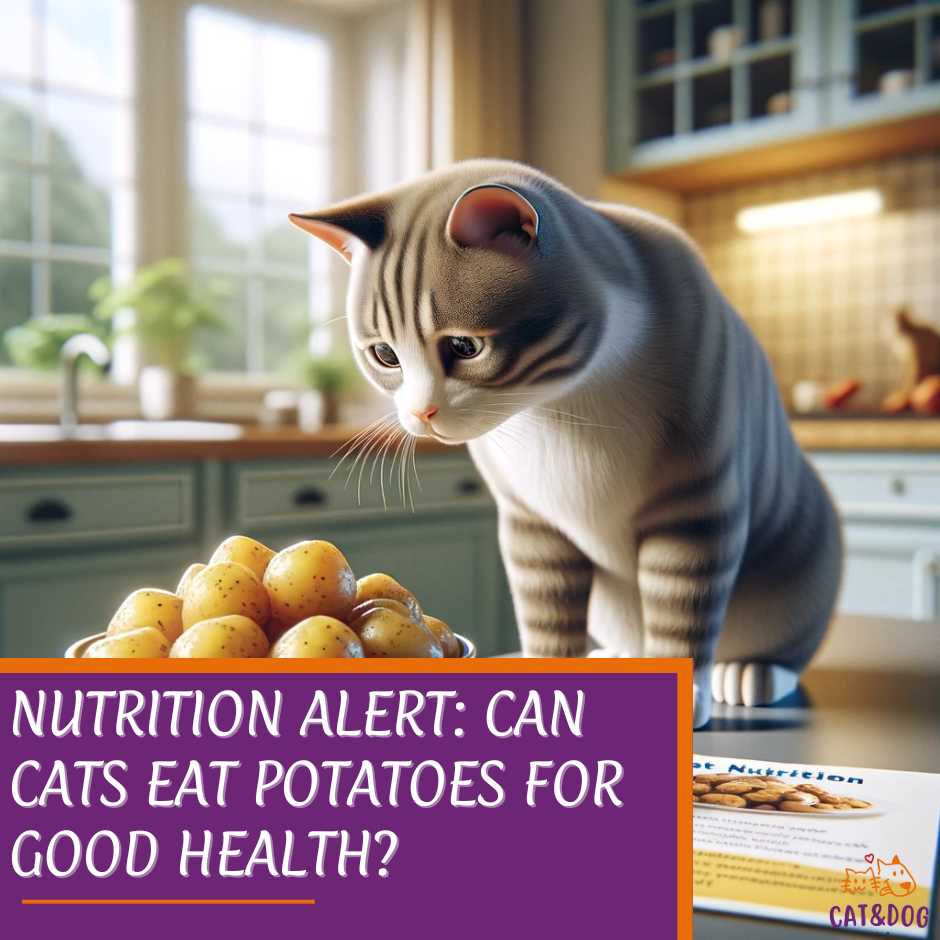When it comes to your feline friends, you might often wonder which human foods are safe for them to enjoy.
Potatoes, a common vegetable in many households, may have you asking whether they belong in your cat’s diet.
Have you ever spotted a potato on your plate and seen those big, curious eyes begging for a taste?
Well, while cats are known for their carnivorous habits, they can safely enjoy certain plant-based foods.
But does that include green potatoes green bits, or even raisins?
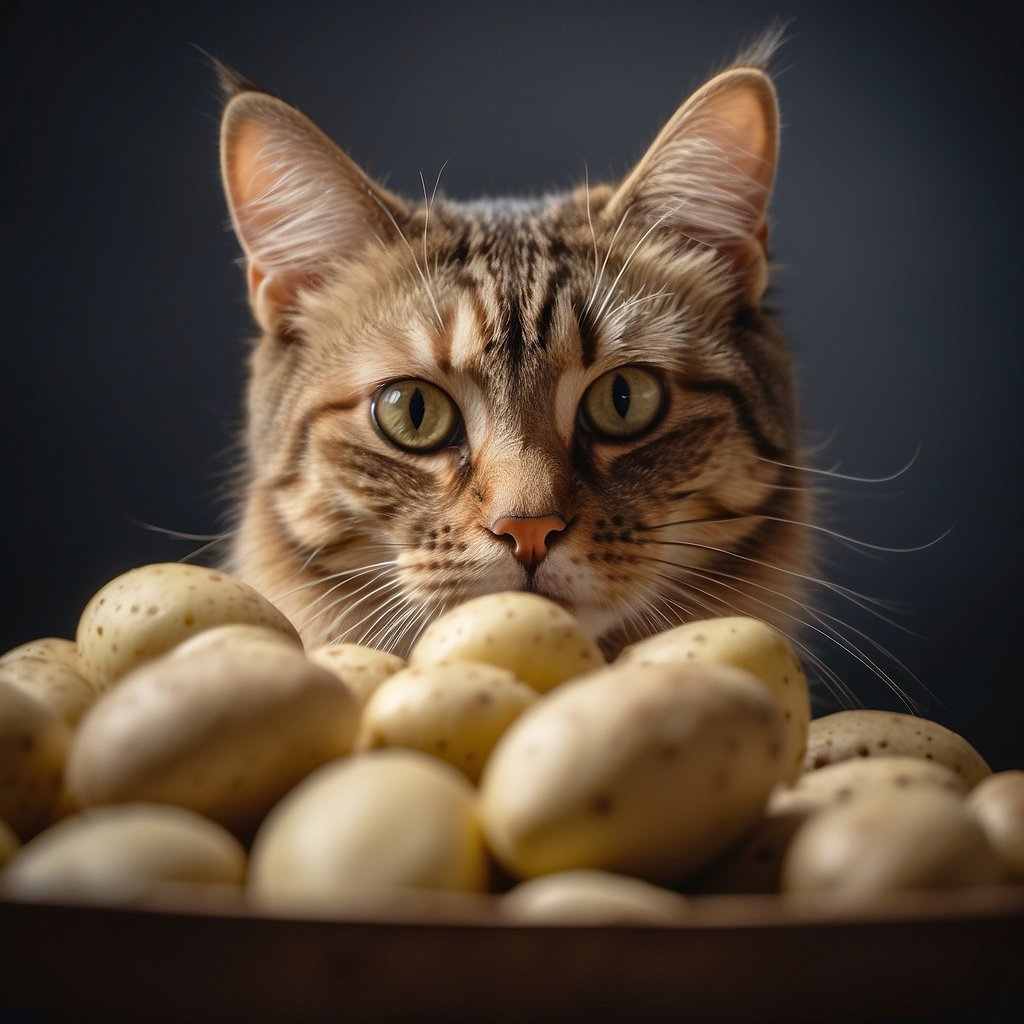
Understanding what’s suitable for your cat to nibble on is essential for their health and happiness.
Cats require a diet rich in proteins and other essential nutrients, including nutrition, to thrive, and while occasional treats are fine, it’s crucial to know the limitations and preparation methods to ensure you’re not putting your furry friend at risk.
So, let’s talk tubers!
Are potatoes, which contain carbohydrates, vitamin C, vitamin B6, fiber, potassium, magnesium, and other essential nutrients, a no-go for wild cats, or can you share a spud with your kitty companion? (1)
Key Takeaways
- Cats can eat cooked, plain potatoes in moderation, but it should not replace their high-protein diets.
- Raw potatoes and those prepared with fats or seasonings can be harmful to felines.
- Always consult with a vet before introducing new foods into your cat’s diet as a treat.
Can Cats Eat Potatoes? Understanding the Basics
Ever wondered while you’re mashing those spuds if your feline friend can have some? Let’s dig into the potato basket and see what’s up with cats and potatoes.
Types of Potatoes and Their Effects
First off, you’ve got your classic white potatoes and the sweeter cousin, sweet potatoes. White potatoes should only be served cooked and in moderation.
Why’s that? Raw white potatoes have solanine, a compound not great for either your belly or your cat’s. (2)
Sweet potatoes? They’re a bit of a different story. Technically not even potatoes, these orange treasures are often considered a healthier choice for humans, but again, these should be a no-go when raw. (3)
Nutritional Profile of Potatoes
When it comes to nutritional benefits, potatoes pack a carb punch with some fiber, but they’re not the protein powerhouse your meat-loving buddy needs.
Cats need meat to thrive; they’re obligate carnivores, which means they rely heavily on nutrients found only in animal products.
Table: Nutrient Composition of Potatoes
| Nutrient | White Potatoes | Sweet Potatoes |
| Carbohydrates | High | High |
| Protein | Low | Low |
| Fiber | Moderate | High |
Remember, snacks should only make up a small part of their diet. If you’re thinking of treating your cat with potatoes, keep it plain and simple — no salt, no butter, just plain ol’ potato!
To sum it up, sure, your kitty can nibble on a bit of potato, but it’s more like an occasional treat than a diet staple. Keep their main meals meaty and they’ll be purring for years to come!
Nutritional Aspects of Potatoes for Cats
Have you ever seen your feline friend eyeing up those mashed potatoes on your plate and wondered if sharing a spoonful is okay? Let’s dish out the details on potatoes and their place in your cat’s diet.
What’s in a potato anyway?
- Vitamins: Potatoes have vitamin C and B-complex vitamins. (4)
- Minerals: There’s also a sprinkle of minerals, such as potassium.
- Fiber: A medium potato can pack about 2 to 3 grams of fiber.
- Carbohydrates: High in carbs, potatoes are a starchy food. (5)
Now, here’s the crunch—cats are obligate carnivores. This means they thrive on meat and have a specific need for animal-based proteins.
Their bodies are finely tuned to extract nutrients like taurine, arachidonic acid, and vitamin A directly from meat sources.
How do potatoes stack up in this scenario? They’re like the guest stars on your cat’s meaty show—they can make an appearance but shouldn’t steal the spotlight. Here’s a simple take:
Cats vs. Potatoes: The Scale of Need
- Protein: Meat > Potatoes
- Carbohydrates: Meat < Potatoes
- Vitamins/Minerals: Meat (complete profile for cats) vs. Potatoes (supplementary)
Now and then, a little bit of cooked potato (never raw! It’s a no-go zone because of toxins like solanine) won’t harm your cat.
But remember, it’s all about moderation. Your cat’s wild ancestors weren’t digging up spuds, so keep potato portions small and infrequent.
In the grand banquet of life, potatoes are the side dish, not the main course, for your carnivorous kitty.
Keep those protein-rich delicacies coming and let potatoes pop up as an occasional treat, and you’ll have one purr-fectly nourished feline!
Safe Ways to Feed Potatoes to Cats
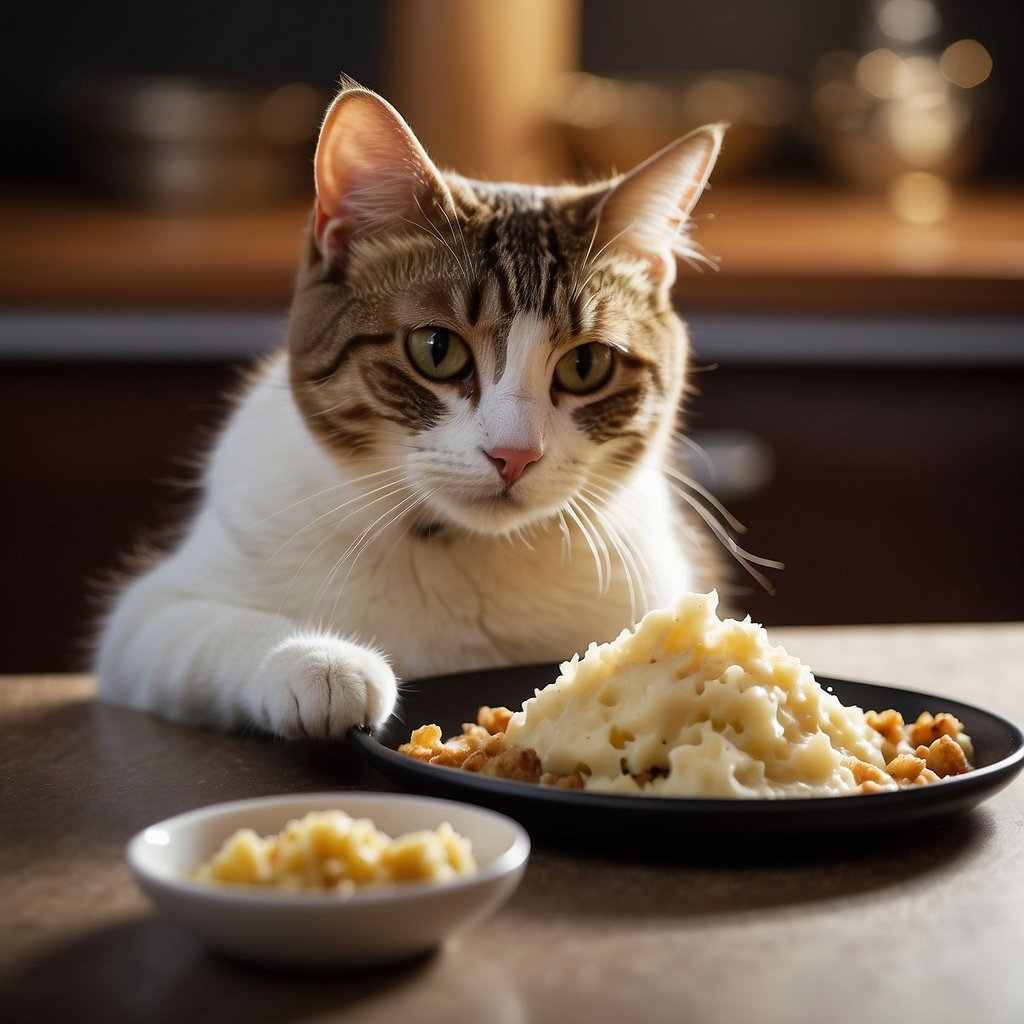
Wondering if you can mix up your furry friend’s diet with a bit of spud? Sure thing, but let’s make sure we do it the right way to keep your whiskered companion happy and healthy!
Preparing Potatoes for Cats
First things first, you’ll want to keep it simple. Here’s how to cook potatoes for your cat:
- Boil or steam the potatoes without any seasonings, salt, or oil. Plain is the name of the game here!
Avoid Toxic Foods: Cats and certain foods just don’t mix. Keep these no-nos out of reach:
- Onions
- Garlic
When considering potatoes as part of Safe Cat Cake Ingredients, it’s crucial to ensure they are cooked plainly without any seasonings, salt, or oil, maintaining the nutritional integrity while keeping your feline’s health in mind.
Portion Control and Frequency
Even good things have their limits, right? Here’s the scoop on portion sizes and how often your cat can enjoy this treat:
- Portion Size: Just a small spoonful will do. Cats don’t need much!
- Frequency: Treat your kitty to potatoes no more than once a week.
Remember, while human food like potatoes, berries can be a treat , they should never replace what your cat usually eats. Cats are meat lovers by nature, after all.
Identifying which foods make safe cat snacks is crucial for their health, and while potatoes can fit into this category, they must be prepared correctly and given in moderation to avoid any health risks
Keep the potato pieces small, occasional, and unseasoned to make sure your cat stays in the purr-fect shape!
Potential Health Risks and Considerations
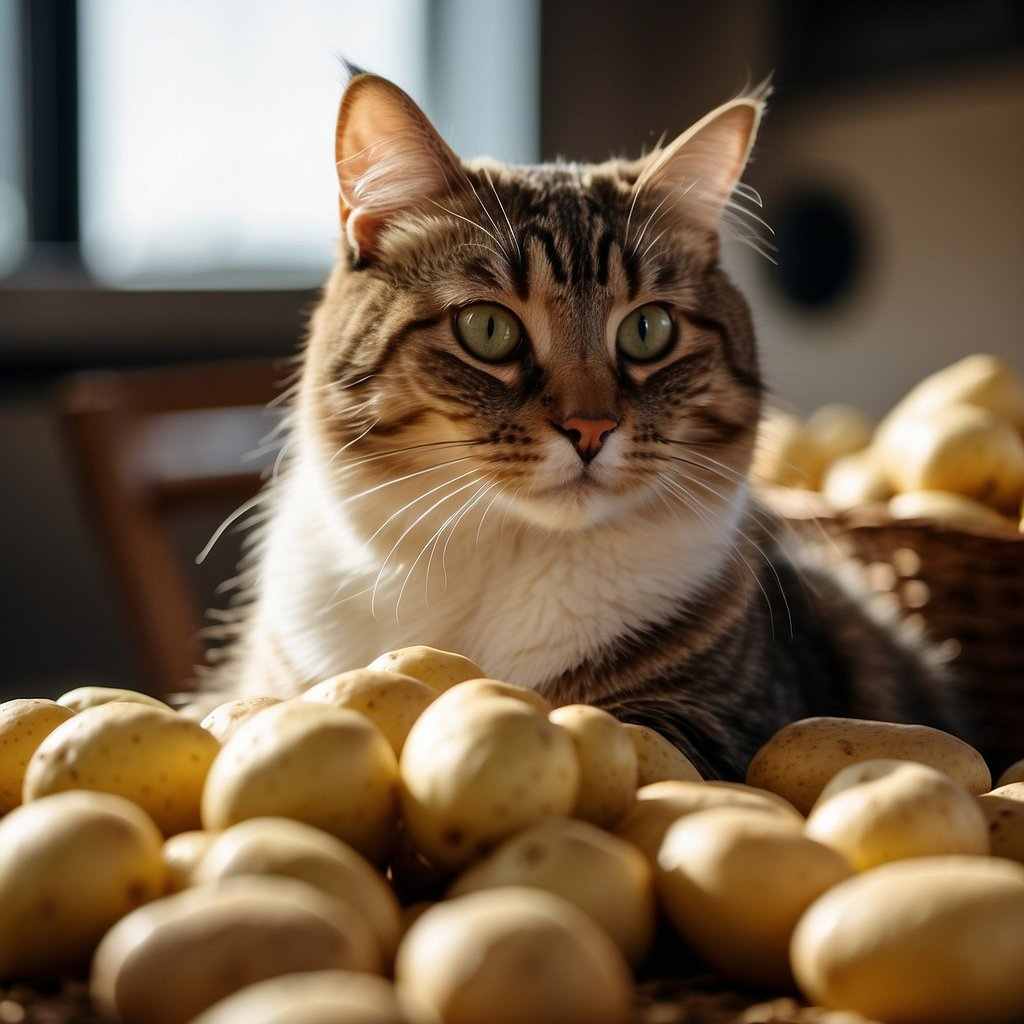
Ever wonder if your furry companion should indulge in a bit of spud?
While a tiny, well-cooked piece of potato might not seem harmful, several health risks warrant a pause for thought.
Excessive Carbohydrates: Cats are natural carnivores, meaning their bodies are honed for protein, not carbs. Too many carbs can lead to:
- Obesity: It’s no joke that our lounging house cats might get a bit, well, rounder with too many treats. (6)
- Diabetes: Just like us, cats can develop diabetes, and a carb-heavy diet is a step in the wrong direction. (7)
Raw Potato Risks:
- Solanine Toxicity: Raw spuds contain solanine, a compound as welcoming as a hissing cat. It’s toxic for them—and for you too! (8)
| Consequences | Cause |
| Vomiting | Solanine ingestion |
| Diarrhea | Excessive carb intake or solanine ingestion |
| Lethargy | Solanine toxicity |
| Neurological Symptoms | High solanine levels |
Real-life Examples:
Remember Mr. Whiskers from the block? His owner thought a potato skin treat was innocuous until Mr. W turned a bit green around the gills. A quick vet visit revealed solanine was the culprit.
Those leaves he snacked on in the garden were a no-go. Another pal, Tabby, bulked up like she was prepping for a sumo career after snacking on potato skin leftovers.
A vet had to intervene to get her back on the mouse-chasing fit path, as gastrointestinal distress can occur from ingesting solanine.
Lesson learned: potatoes can be part of your cat’s diet, but only occasionally and properly prepared. When in doubt, less is more, and always chat with your vet about safe snacking for your carnivorous companion.
Expert Opinions and Veterinary Perspectives
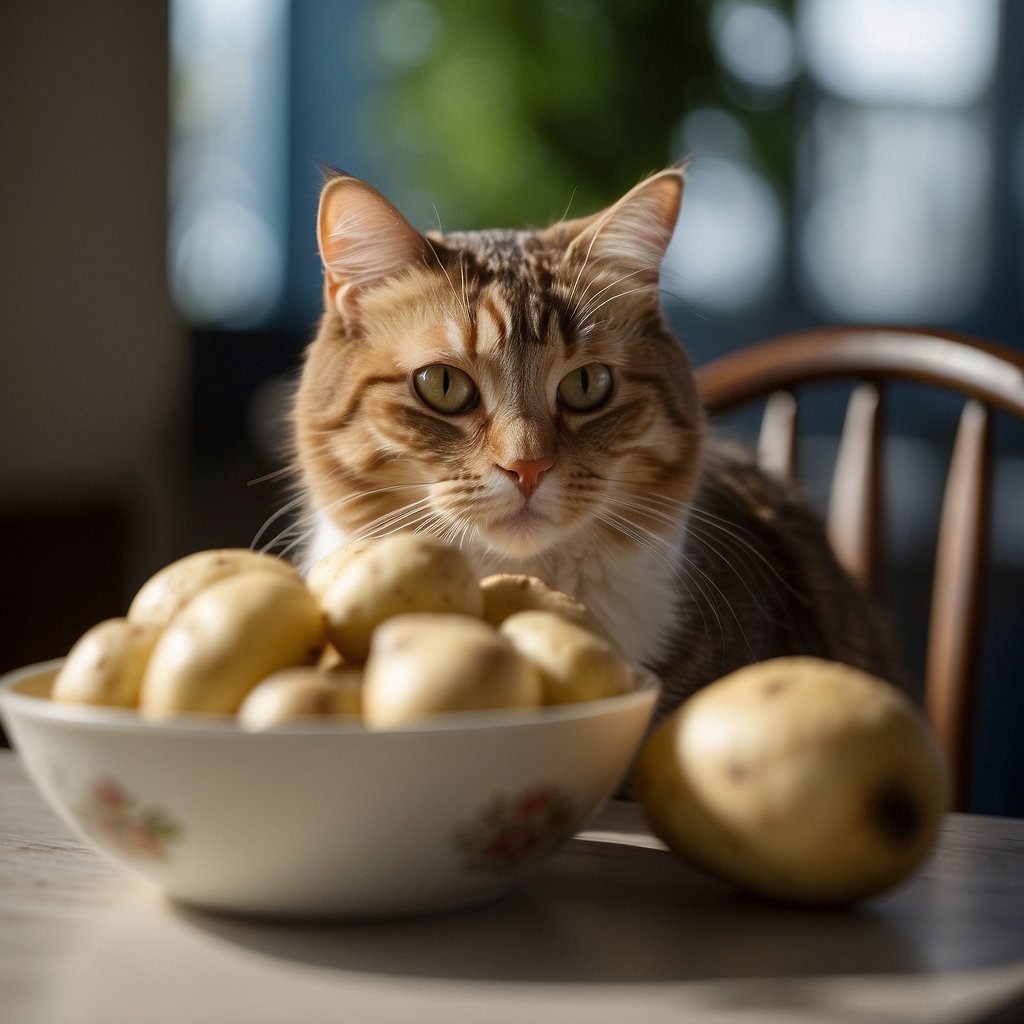
Have you ever wondered whether it’s fine to share your potato snacks with your purring friend? Veterinarian consensus is clear on the matter: Potatoes are only cat-friendly under certain circumstances.
Potatoes should be cooked without any added fats or seasonings before considering them as a treat for your cat.
Why plain potatoes? Vets warn that added ingredients can wreak havoc on your cat’s digestive system. Raw potatoes are a big no-no because they contain solanine, a compound as nasty for cats as it is for humans.
If ingested, it can lead to symptoms like:
- Vomiting
- Diarrhea
- Lethargy
- Disorientation
But don’t panic just yet! A small bite of plain, baked, or boiled potato can occasionally pass as a treat. Cats, those obligate carnivores, usually won’t need the carbs, but they might show interest.
Here’s a quick rundown:
| State of Potato | Cat-Friendly? | Notes |
| Raw | No | Contains solanine; toxic. |
| Boiled/Baked | Yes | Only if plain and unseasoned. |
| Fried | No | Fats and oils are unhealthy. |
When should you buzz the vet?
Keep an eye out if your buddy shows signs of distress after a potato session. You know your feline friend best; if they seem off after nibbling some tuber, it’s better to err on the side of caution.
Remember, moderation is key, and your cat’s health always comes first. When in doubt, give your vet a shout. They’ll help clear the fog and guide you on what’s best for your whiskered companion’s diet.
Alternative Healthy Treats for Cats
Ever wondered if that kitty of yours gets tired of the same old snacks? Let’s jazz up their treat repertoire with some nutritious and feline-friendly alternatives!
Safe Fruits and Vegetables: Your furball may pounce at the chance to try some safe fruits and veggies. Here’s a quick list:
- Pumpkin: A dab of plain, cooked pumpkin can soothe your cat’s tummy and provide fiber.
- Carrots: Crunchy and packed with beta-carotene. Remember, cook them up to prevent choking hazards!
- Melon: Low-calorie hydration in a sweet, chewy package. Who knew, right?
- Blueberries: Tiny, but bursting with antioxidants.
Just a heads up, though – always serve fruits and veggies in moderation and without any added sugars or seasonings.
Commercial Cat Treats: On the lookout for something a bit more convenient?
The market’s got your back with a variety of nutritionally balanced commercial treats specifically designed for your whiskered companion. Consider these options:
- Freeze-dried protein treats: They often contain a single ingredient like chicken, salmon, or liver – pure protein without preservatives.
- Dental chews: These not only satisfy the munchies but also keep those pearly whites clean and healthy.
- Hairball control treats: Formulated to help manage those pesky hairballs.
Whether it’s a spoonful of veggies or a crispy commercial snack like potato crisps, these options are purr-fect for keeping snack time fresh and nutritious.
Remember to treat these as a supplement to a well-balanced diet – moderation is key!
Now, go ahead and be your kitty’s hero by introducing some new flavors like potato crisps into their life, a wonderful way to bond with your favorite feline.
Enhancing User Engagement
Have you ever spotted your feline friend eyeing your dinner plate, especially when potatoes are on the menu? You might wonder if sharing a bite is safe. Let’s crunch the numbers and not just the tasty treats!
Nutritional Breakdown of Potatoes for Cats:
| Component | Amount in 100 grams |
| Calories | 77 kcal |
| Protein | 2 grams |
| Carbohydrates | 17 grams |
| Dietary Fiber | 2 grams |
| Fat | 0.1 grams |
Although potatoes can be a tasty filler, their nutritional profile doesn’t align with your cat’s dietary needs. Cats are obligate carnivores, requiring a diet high in protein—and that just can’t be fulfilled by a spud!
Are Your Potatoes Cat-Friendly?
- Always cook potatoes thoroughly to eliminate solanine, a toxin present in raw, green, or sprouted potatoes.
- Avoid any additions like oil or seasoning that can be harmful to cats.
Challenge time! Test your knowledge with our “Feline Foodie Quiz” and see if you’re the cat’s whiskers when it comes to your pet’s diet!
Curious about how to make potatoes a rare treat? Cats may enjoy a small, cooked, plain potato. But remember, moderation is key.
A chunk of potato can be a playful snack, but it should never replace meat in their diet.
By making content informative and paw-sitively interactive, you’re not just reading; you’re engaging and learning what’s best for your kitty’s diet.
Next time you’re prepping potatoes, you’ll know exactly what to do! Keep these tips in mind and you’ll be the purr-fect pet parent.
And there you have it; sharing potatoes with your cat can be safe, but it’s not the most nutritious choice. Stick to a meat-centric menu, and you’re on track for a happy, healthy cat. Now, isn’t that a-peeling?
Quick Recap
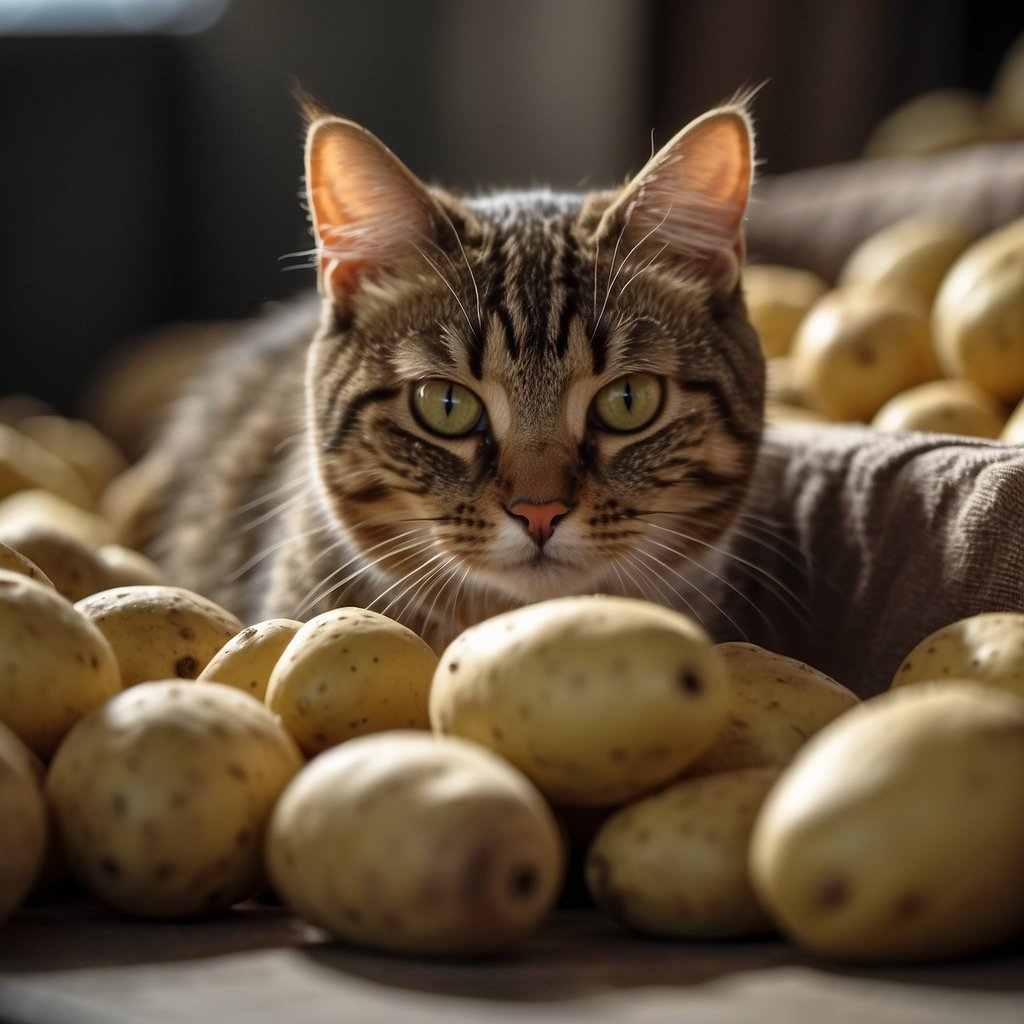
Wondering if you can share a bit of your potato with your furry friend? Let’s bullet out what we’ve learned:
- Raw Potatoes: A big no-no. Just like with us humans, raw potatoes contain solanine, a compound that’s toxic for cats.
- Cooked Potatoes: They’re safe in moderation. Remember, moderation is key here.
- Nutritional Value: Potatoes aren’t nutritionally beneficial for cats, so they should only be an occasional treat.
Are you thinking of spicing up your cat’s diet with some potatoes?
- Start with a Clean Potato: Make sure it’s washed and peeled.
- Cut Out the Bad Bits: Any green or discolored spots have got to go.
- Cook Simply: Roast or boil without adding salt or fats.
Now, you may find potatoes in commercial cat food, often as a filler, which could lead you to think potatoes are a dietary staple for cats.
But not every ingredient in cat food is necessary for a cat’s diet. Your cat primarily needs protein—think meats and specifically formulated cat food.
- Sweet Potatoes: A safer option since they lack solanine. Still, they’re a treat, not a staple.
To wrap things up—yes, your cat can nibble on cooked potatoes occasionally, but it’s not a must-have in their diet.
Stick with their regular, meat-based diet and consult your vet for the best option on fine occasional treats, including a sliver of plain potato.
They’ll likely tell you that a sliver of plain potato is fine but not to make it a habit. Keep those potatoes on the side of caution!
Frequently Asked Questions
Is it safe for my cat to munch on cooked potatoes?
Yes, your cat can safely nibble on small amounts of cooked potatoes. Make sure they’re plain and free from any seasonings or additives that could harm your furry friend.
Can potatoes be part of a cat’s daily diet?
No, potatoes should not be a staple in your cat’s diet. Cats need protein from meat to thrive, so keep potatoes as an occasional treat.
Can kittens eat potatoes, or is it only safe for adult cats?
Kittens have sensitive digestive systems, so it’s best to avoid giving them potatoes. Their diet should be strictly high-quality kitten food that provides all necessary nutrients.
What are the signs of potato intolerance or allergy in cats?
Watch out for symptoms like vomiting, diarrhea, or skin issues. These could signal that your cat is intolerant or allergic to potatoes.
How much potato can a cat have before it’s too much?
A couple of small bites of cooked potato can be enough for your cat. Anything more might upset their stomach, so moderation is key.
Is it okay to feed my cat potatoes if they have a medical condition like diabetes?
It’s best to consult your vet before feeding potatoes to a cat with diabetes or any medical condition, as it can impact their blood sugar levels and overall health.

